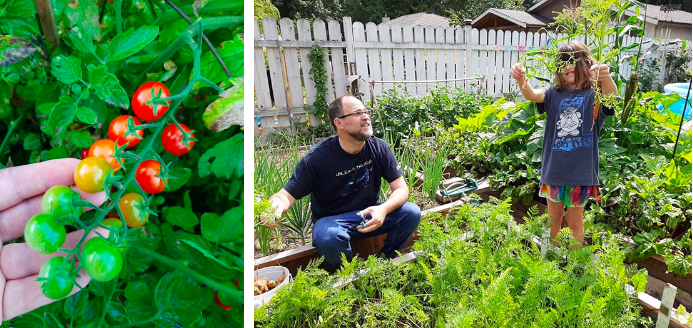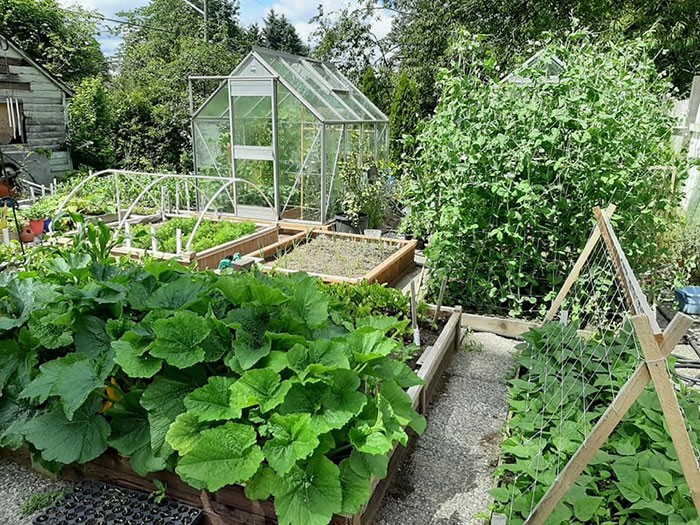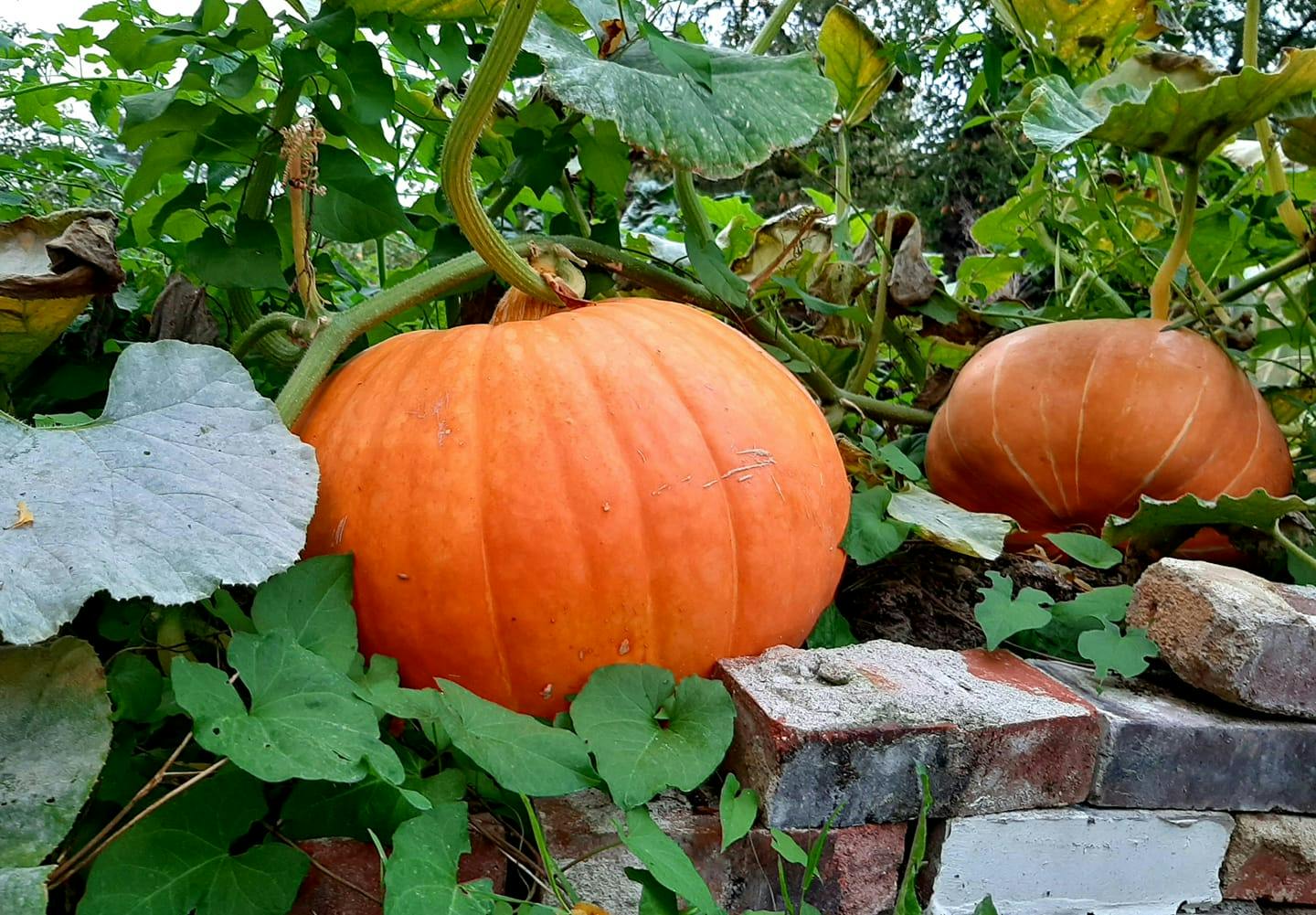Gardening for the Climate Apocalypse
As we put our veggie plots to bed, I consider a future where growing food isn’t just fun for my kids, but necessary.
There’s a small window on the west coast between summer’s brief heat and the rain that dominates the rest of the year, which leaves only small pockets of time in early autumn to strip the garden for winter. A few weeks ago, our garden boxes overflowed with tangled vines, tidy rows of leeks and carrots, and mounds of mint and parsley. But now all that remain are a few late beets, a pair of heavy-headed sunflowers, and a trio of fat pumpkins waiting for Halloween.
It’s messy work, chopping back vines and pulling plants out by the roots while making sure to leave the perennials — the strawberries, the herbs — untouched. I can feel winter in the soil now, a chill that makes my hands ache if I forget my garden gloves. The ground is already muddy, and the morning dew burns off later and later each day, cousin to the coming frost. By day’s end, I’ll have dirt in my hair, on my knees, and under my fingernails.
But this labour is pleasurable in its way — satisfying, quiet, purposeful. The autumn sun is warm on my back, and my body always feels strongest when doing hard but useful work. The cycle of seasons never feels more obvious than when the garden is put to bed, a reminder that the end is, in fact, also the beginning.
The spring before last, I’d watched my preteen children hunker down next to their dad, heads bowing over the newly turned dirt, hands full of corn seed. I couldn’t hear what he said, but I knew he was telling them how to make things grow: “Dig a hole about this deep. Drop the seeds in, there you go. Push the dirt back and pat it down. No, gently, gently, like this.” They nodded, solemn and attentive. Crouched down, with messy hair and dirt on their faces, they looked almost as they did as toddlers, thrilled by everything.
We’d rototilled the ground on that side of the house earlier in the day. The lawn had been badly damaged from drainage repairs to our 80-year-old house, reducing a once-lush carpet of green to a bumpy patchwork of moss, weeds, and a few resilient tufts of grass. I’d balked when my husband first suggested we turn it into a “corn patch” instead of re-seeding with grass or maybe clover. “Corn,” I repeated, incredulous. “Corn…in the middle of the yard? Right next to the road where neighbours walk by in the evening? Where the kids play?”
He pulled the ace out of his back pocket: “I’ll be teaching the kids how to grow stuff. They should know, for the future.”
I’d put my foot down. Definitely not. But he continued arguing for it throughout the day, with an endless list of points in favour: It’s a good use of space, productive, practical. It’ll be cheaper than new grass. We won’t have to mow it. And we can eat the corn, share it with family. I countered with vague objections, most of which boiled down to the fact it wouldn’t look like everyone else’s yard.
He pointed out that I always rail about the uselessness of suburban lawns and the water they waste, the pretense and nonsense of the entire concept. Still, I resisted. At an impasse, he pulled the ace out of his back pocket: “I’ll be teaching the kids how to grow stuff. That’s important. They should know, for the future.”
For the future. I nodded. Turned away. Swallowed and shrugged. “All right,” I said. “We can have a corn patch.”

The planet is dying. Or, more correctly, the conditions under which humans have thrived on this planet are in rapid decline. So perhaps it is actually we humans who are dying, collectively and in slow motion. The fact that we were in trouble was well established by the time I thought about starting a family 15 years ago. The news was full of stories about animals going extinct, wildfires raging out of control, increases in ocean temperature. The scientists who study such things were pointing in panic at the Arctic’s melting permafrost, and receding glaciers. It was terrible and frightening, but we could still keep it at arm’s length, then.
I know I gave careful consideration to the idea of having children. But I thought about the usual things: Could I do a decent job raising them, teaching them right from wrong? Would there be enough money for diapers and soccer registration and college? Would we mind the lack of sleep, the clutter of toys, the layer of crushed Cheerios on the floor of the car?
It didn’t occur to me to wonder what it would mean to raise them in a world where the possible future outcomes have shrunk from “Maybe it’ll all be OK,” to “We are definitely screwed.”
They’ve already absorbed the fundamental lesson: that time and patience and seeds and water and sun and dirty hands will equal food, eventually.
We got lucky a few years ago with a used glass-and-aluminum-frame greenhouse my sister no longer wanted in her own yard. My husband built a base for it in one corner of the garden and filled it with pots. In the artificial climate, green peppers, cucumbers, and tomatoes overflowed, riotous and magical. The kids slid the door open and laughed at the gust of tropical air that escaped, marvelled at the plants, and helped their dad pick the harvests as they ripened.
“Bring this to your mom,” I’d hear him say from beyond the kitchen’s screen door, and seconds later a stampede of two would arrive, pausing only long enough to let me exclaim over their skill as farmers before racing back out for more. Together with the beets, carrots, and onions in the rest of the garden, we could barely keep up with all of it, and sent every visitor home with bags of vegetables.
I know they’re too young to have memorized the specifics just yet — which vegetables need more or less water, sun or shade, and when to plant and harvest. But they’ve already absorbed the fundamental lesson: that time and patience and seeds and water and sun and dirty hands will equal food, eventually. Knowing this equation might just save them, someday. And watching them learn it saves me, a little bit, each day.
I wake up in the middle of the night and check my children are still breathing, then lie in my own bed thinking about the systems society has created to keep us fed and warm, with electricity, clean water, and other luxuries we’ve long since forgotten are luxuries at all.
It feels so fragile now, a precarious structure that could tumble down at any moment — tomorrow morning or next year or a decade from now. And then what? How long does it take for our most base instincts to kick in? How many days could we go without food, electricity, water, or medicine before our neighbours became our enemies?
I worry. For my children, for my siblings, for my friends, for the people I love who are too far away for me to protect. I worry about how to change course, and that it’s too late for any course change to make a difference. I worry I can’t predict if the shifts ahead of us will arrive slowly, bearing down a little at a time, or come all of a sudden, a crash from which we will not recover.
If we are not here, the Earth certainly won’t care. In fact, she will likely breathe a great sigh of relief in our absence.
But I don’t worry so much about the Earth, though my heart breaks with each additional wound we inflict. The Earth will go on with or without us; she does not need us as we need her. When we destroy her to the point we can’t live here anymore, she’ll spend the next million years evolving in new ways, with different kinds of life. She might someday be covered entirely in algae, fungus, bacteria, and moss. She might be all ocean, a water-world teeming with sea creatures looking like long-lost cousins of those today. She might be a desert, with lizards hiding in cool dark dens, cactuses blooming once every hundred years when the rain comes for a handful of minutes.
If we are not here — we teeming masses of humanity who consume and consume and consume without thought for the future or even for each other — the Earth certainly won’t care. In fact, she will likely breathe a great sigh of relief in our absence.

I often scold myself for being so dramatic, and then make morbid jokes about Mad Max Beyond Thunderdome and zombie apocalypses and how my crochet skills will come in handy after the big collapse. It’s all fear covered by cavalier comedy.
I am, by nature, an optimist. A fan of happy endings and the last-minute save. The good guys stop the asteroid. The wacky scientist finally gets the government’s attention. A small group of outcasts save the world in the end. That’s how it goes, right? But every summer is hotter than the last, and winters arrive with snowfalls that bring cities to a standstill for days on end. Sea levels are rising faster than we expected. Chunks of ice the size of major cities crack off the edge of Antarctica so frequently now that it barely makes the headlines. Animals and plants are disappearing, or slipping so close to extinction they may as well already be gone.
My children are 10 and 13 now. Is it dramatic to imagine that the Earth will not be able to sustain them in the future — even in the very near future? Is it dramatic to question what I’ve done by having brought them into this world without better forethought, so casually in retrospect? Is it dramatic to teach them how to grow corn, beets, and cucumbers, to show them how to save seed from one season to the next, and to tell myself it might be their saving grace someday?
It feels less and less dramatic by the day.
We got lucky, again, with a second greenhouse six months after the first one. My husband found it for sale on Facebook: only $100, so long as we didn’t mind dismantling it ourselves, cleaning off a decade or two of moss buildup, and replacing a few panes of glass.
We didn’t mind at all, for that price. We brought it home, stashed the pieces in the shed, and waited for the next spring. As soon as it was warm enough, my husband built a second base right next to the first, filled it, and then spent the summer pulling out more food than we could eat. On the other side of the yard, he shoved chunks of potato into the ground, where they grew into a dozen leafy plants, each exploding underground into a network of potatoes tangled in roots. The corn patch doubled.
Is it dramatic to question what I’ve done by having brought them into this world without better forethought, so casually in retrospect?
He’s already begun to ponder next year’s expansions. I tell him to grow stuff we can preserve as pickles or jams, squashes that will keep well in dry storage, things that can last far beyond the harvest season. I know the children will help, doing a bad job at weeding and a good job at enthusiasm.
I pretend I appreciate the garden for its impact on my grocery budget or because a fresh tomato always tastes better than one from the store. But in truth, I don’t think much about these things. The garden is a buffer from the future, a salve for uncertainty. It eases my anxiety to see the jars lined up, the potatoes waiting, the onions hung in the basement. Evidence, however small, of our ability to survive.
